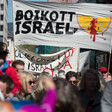The Electronic Intifada 22 January 2016

The Stolen Homes campaign is calling on Airbnb to stop listing vacation rentals in Israeli settlements.
ActiveStillsAirbnb, the popular travel website, is the target of a new campaign against its listings of accommodation in the settlements built by Israel in the occupied West Bank.
Five organizations launched a campaign called Stolen Homes on Wednesday calling on Airbnb “to immediately stop listing vacation rentals in Israeli settlements, all of which were built on stolen Palestinian land and deemed illegal under international law.”
A petition notes that “through earning fees from settlement vacation rentals, Airbnb is directly profiting from the continuing occupation and dispossession of Palestinians.”
The petition is supported by the US Campaign to End the Israeli Occupation, American Muslims for Palestine, Jewish Voice for Peace, the US Palestinian Community Network and Codepink.
Earlier this month, +972 Magazine reported that not only does Airbnb list accommodation in Israeli settlements, but that without exception the listings do no mention that they are located on occupied land.
Settlement profiteering
The issue has since been covered in the Israeli and international media.
The California-based Airbnb has declined to comment, apart from releasing a short statement which read: “We follow laws and regulations on where we can do business and investigate concerns raised about specific listings.”
The Palestinian Boycott Divestment and Sanctions National Committee (BNC) has denounced Airbnb. Omar Barghouti, a founder of the BNC, said recently that “Airbnb can and should immediately exclude all Israeli settlements from its offerings as a significant first step towards complying with its human rights obligations under international law.”
Also this week, Human Rights Watch released a report calling on international businesses to cease all cooperation with Israeli settlements in the West Bank.
Airbnb earns a 3 percent fee from its hosts and a further fee — usually 6-12 percent — from guests. So the company profits every time someone makes a reservation using its settlement listings.
Human Rights Watch this week argued that companies cannot mitigate their contribution to Israel’s human rights violations so long as they operate in settlements. It stated that companies must cease working with the settlements in order to honor their human rights obligations.
Sensitive to bad publicity?
As it promotes the concept of “community-driven hospitality,” Airbnb may be sensitive to publicity that harms the company’s reputation.
The company depicts itself as environmentally friendly and has claimed to care about people in need by launching a “disaster response initiative.”
The wider campaign for boycott, divestment and sanctions has persuaded a number of firms to cease their activities in Israel and the occupied West Bank lately.
As Barghouti told Al Jazeera, “much larger corporations — of the caliber of Orange, Veolia and CRH — have been eventually compelled by BDS campaigning to end their complicity in Israel’s human rights violations after losing massive contracts.”
Airbnb is likely to come under a great deal of pressure until it ceases trying to profit from Israel’s illegal activities.
Ryan Rodrick Beiler is a freelance photojournalist and member of the ActiveStills collective who lives in Oslo, Norway.





